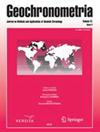波兰Tyszowce黄土沉积的OSL年代学
IF 0.9
4区 地球科学
Q3 Earth and Planetary Sciences
引用次数: 12
摘要
提出的工作涉及位于Tyszowce的黄土剖面,在波兰东部的沃林高地,靠近乌克兰边境。所研究的黄土地层保存完好,地层单元清晰,为完善波兰的黄土年代地层提供了机会。本文给出了波兰东南部末次冰期(约100 ka)黄土的发光年龄和7个放射性碳年龄。采用红外(post-IR IRSL)和蓝光激发发光测年法对21个样品进行了测年。采用多矿物细颗粒(4 ~ 11 μm)和中等尺寸石英颗粒(45 ~ 63 μm)两组。两种方法所得的发光年龄在黄土沉积物中具有很好的一致性,但对于化石土壤单元,ir后的IRSL方法所得的年龄更大。放射性碳测年也证实了较年轻单位的发光年代地层。此外,发光结果还得到了粒度分布、碳酸盐含量和磁化率变化的详细分析的支持,从而形成了该遗址年代学演变的全面图景。本文章由计算机程序翻译,如有差异,请以英文原文为准。
OSL chronostratigraphy for loess deposits from Tyszowce – Poland
Abstract The presented work concerns a loess profile located in Tyszowce, in the eastern part of Poland on the Volyn Upland, close to the Ukrainian border. The investigated loess formation is well preserved and is characterised by clear stratigraphic units providing an opportunity to refine the loess chronostratigraphy in Poland. In the paper, we present luminescence ages of loess from the last glacial cycle in SE Poland (up to about 100 ka) together with seven radiocarbon ages. Twenty-one samples were collected and dated using infrared (post-IR IRSL) and blue light stimulated luminescence dating. Two fractions were used, namely polymineral fine grains (4–11 μm) and medium sized quartz grains (45–63 μm). The obtained luminescence ages show very good agreement of both methods in relation to loess deposits, however for the fossil soil units the post-IR IRSL method yields older ages. Radiocarbon dates also confirm luminescence chronostratigraphy for younger units. Moreover, the luminescence results are supported by detailed analyses of grain size distribution, carbonate content and magnetic susceptibility variations allowing to create a comprehensive picture of chronological evolution of this site.
求助全文
通过发布文献求助,成功后即可免费获取论文全文。
去求助
来源期刊

Geochronometria
地学-地球科学综合
CiteScore
2.20
自引率
0.00%
发文量
1
审稿时长
>12 weeks
期刊介绍:
Geochronometria is aimed at integrating scientists developing different methods of absolute chronology and using them in different fields of earth and other natural sciences and archaeology. The methods in use are e.g. radiocarbon, stable isotopes, isotopes of natural decay series, optically stimulated luminescence, thermoluminescence, EPR/ESR, dendrochronology, varve chronology. The journal publishes papers that are devoted to developing the dating methods as well as studies concentrating on their applications in geology, palaeoclimatology, palaeobiology, palaeohydrology, geocgraphy and archaeology etc.
 求助内容:
求助内容: 应助结果提醒方式:
应助结果提醒方式:


